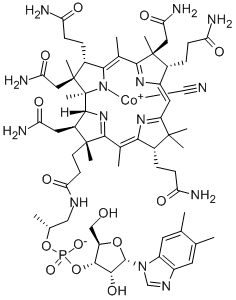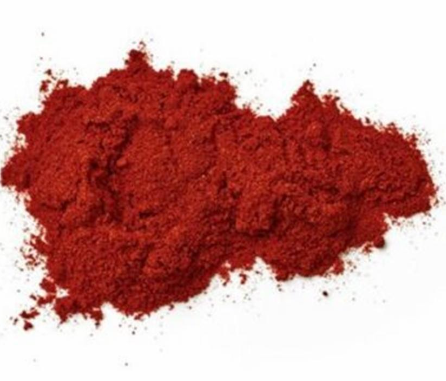
Cobalamine
- Product NameCobalamine
- CAS13408-78-1
- CBNumberCB00127455
- MFC63H88CoN14O14P
- MW1355.37
- EINECS236-500-2
- MDL NumberMFCD00151092
- MOL File13408-78-1.mol
- MSDS FileSDS
Chemical Properties
| storage temp. | 2-8°C |
| NCI Dictionary of Cancer Terms | cobalamin |
| FDA UNII | 8406EY2OQA |
| NCI Drug Dictionary | cobalamin |
Cobalamine Chemical Properties,Usage,Production
Chemical Properties
Cobalamine is the most chemically complex of all the vitamins.The structure of Cobalamine is based on a corrin ring, which is similar to the porphyrin ring found in heme. The central metal ion is cobalt. As isolated as an air-stable solid and available commercially, cobalt in Cobalamine (cyanocobalamin and other vitamers) is present in its +3 oxidation state. Biochemically, the cobalt center can take part in both two-electron and one-electron reductive processes to access the "reduced" (B12r, +2 oxidation state) and "super-reduced" (B12s, +1 oxidation state) forms. The ability to shuttle between the +1, +2, and +3 oxidation states is responsible for the versatile chemistry of vitamin B12, allowing it to serve as a donor of deoxyadenosyl radical (radical alkyl source) and as a methyl cation equivalent (electrophilic alkyl source).

Uses
Cobalamine is an essential vitamin and medication used to manage and treat pernicious anemia, ileal resection, treatment of spinal cord myelopathy, and other conditions.Definition
Cobalamine is a coordination complex of cobalt, which occupies the center of a corrin ligand and is further bound to a benzimidazole ligand and adenosyl group.A number of related species are known and these behave similarly, in particular all function as vitamins.Health Hazard
Cobalamine deficiency can potentially cause severe and irreversible damage, especially to the brain and nervous system.Deficiency at levels only slightly lower than normal can cause a range of symptoms such as fatigue, feeling weak, lightheadedness, dizziness, breathlessness, headaches, mouth ulcers, upset stomach, decreased appetite, difficulty walking (staggering balance problems),muscle weakness, depression, poor memory, poor reflexes, confusion, and pale skin, feeling abnormal sensations, among others, especially in people over age 60.Cobalamine deficiency can also cause symptoms of mania and psychosis.mong other problems, weakened immunity, reduced fertility and interruption of blood circulation in women may occur.Health effects
Cobalamine is an especially important vitamin for maintaining healthy nerve cells, and it helps in the production of DNA and RNA, the body's genetic material. Cobalamine works closely with vitamin B9, also called folate or folic acid, to help make red blood cells and to help iron work better in the body. Folate and B12 work together to produce S-adenosylmethionine (SAMe), a compound involved in immune function and mood.
Physiological effects
cobalamin is a water-soluble vitamin involved in metabolism.It is one of eight B vitamins. It is required by animals, which use it as a cofactor in DNA synthesis, and in both fatty acid and amino acid metabolism.It is important in the normal functioning of the nervous system via its role in the synthesis of myelin, and in the circulatory system in the maturation of red blood cells in the bone marrow.Plants do not need cobalamin and carry out the reactions with enzymes that are not dependent on it.
Preparation Products And Raw materials
Cobalamine Supplier
| Supplier | Tel | Country | ProdList | Advantage | |
|---|---|---|---|---|---|
| +86-15531157085 +86-15531157085 |
abby@chuanghaibio.com | China | 8805 | 58 | |
| +86 13288715578 +8613288715578 |
sales@hbmojin.com | China | 12824 | 58 | |
| +86-13131129325 | sales1@chuanghaibio.com | China | 5878 | 58 | |
| 0592-5800732; +8613806035118 |
xie@china-sinoway.com | China | 989 | 58 | |
| +86-15532196582 +86-15373005021 |
lisa@kingfinertech.com | China | 3007 | 58 | |
| +86-18572802410 +86-18572802410 |
sales@marcopht.com | China | 30 | 58 | |
| +8618092446649 | sarah@tnjone.com | China | 1143 | 58 | |
| +86-13591747876 +86-13591747876 |
alex1_auco@126.com | China | 299 | 58 | |
| 18871490254 | linda@hubeijusheng.com | CHINA | 28172 | 58 | |
| +8613081092107 | CHINA | 964 | 58 |
View Lastest Price from Cobalamine manufacturers

13408-78-1, CobalamineRelated Search
The What'sApp is temporarily not supported in mainland China